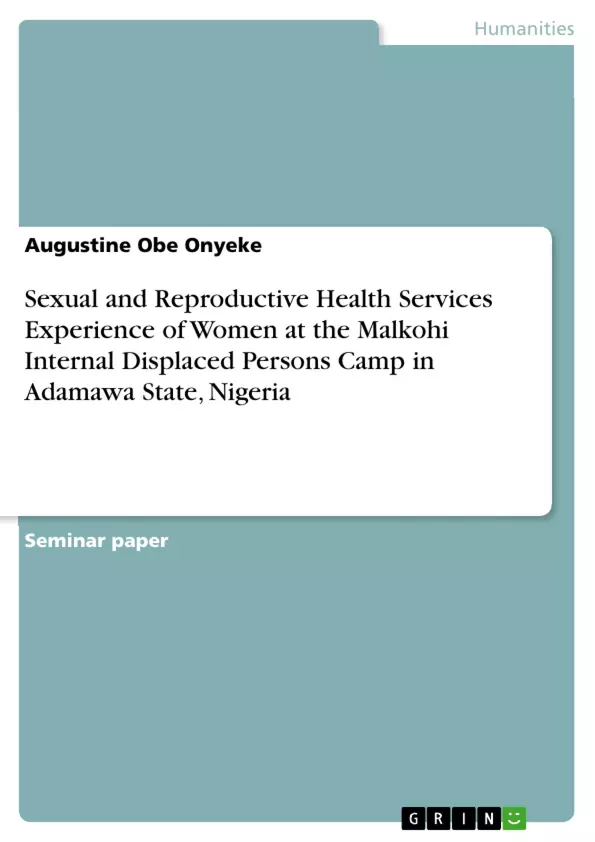This study describes the SRH services provided and utilized by women of reproductive age at Malkohi IDP camp in Yola south of Adamawa state in Nigeria. Notably, the paper aimed to outline the types of SRH services, the volume of services provided, and the status of utilisation by women of reproductive age in the Malkohi IDP camp in Adamawa state. the findings indicate that women of reproductive age in Malkohi IDP camp experience multi-faceted barriers to utilising SRH services. These barriers include a lack of comprehensive Minimal Initial Service Package (MISP), limited reliable information on sexual and gender-based violence (SGBV), limited supply of menstrual hygiene and sanitation products, lack of supply of commodities, and SRH supplies as a result of donor inconsistency. A cross-sectional descriptive analysis was adopted. Two focus group discussions composed of 14 women of reproductive age each was held.
Inhaltsverzeichnis (Table of Contents)
- ABSTRACT
- BACKGROUND
- METHOD
- Study design and participants
- Data collection
- Data analysis
- RESULTS
- Hygiene
- Inadequate drugs/Kits
- Cultural influence
Zielsetzung und Themenschwerpunkte (Objectives and Key Themes)
This study investigates the provision and utilisation of sexual and reproductive health (SRH) services by women of reproductive age at the Malkohi Internally Displaced Persons (IDP) camp in Adamawa state, Nigeria. The study aims to shed light on the types of SRH services offered, the volume of services provided, and the extent of their utilization by women in the camp. The research delves into the barriers women face in accessing SRH services, particularly in the context of the ongoing insurgency in the region.
- Challenges and barriers to accessing SRH services for women in IDP camps
- The impact of the insurgency on women's reproductive health and well-being
- The adequacy of SRH services provided at the Malkohi IDP camp in relation to the Minimal Initial Service Package (MISP)
- The influence of cultural factors on SRH service utilisation
- The role of hygiene and access to essential supplies in SRH service provision
Zusammenfassung der Kapitel (Chapter Summaries)
The study utilizes qualitative data from interviews with women residing in the Malkohi IDP camp. The research focuses on understanding the experiences of women in accessing SRH services, particularly in the aftermath of the insurgency in northeastern Nigeria. The study identifies key themes related to hygiene, availability of medical supplies, and the influence of cultural factors on SRH service utilisation. The findings highlight the complexities of providing effective and accessible SRH services in a conflict-affected setting, with particular emphasis on the challenges faced by women in accessing essential menstrual hygiene products and adequate medical supplies.
Schlüsselwörter (Keywords)
The research explores sexual and reproductive health services, internally displaced persons (IDPs), insurgency, women's health, hygiene, menstrual hygiene, cultural influence, access to healthcare, Minimal Initial Service Package (MISP), Adamawa state, Nigeria.
Frequently Asked Questions
What is the focus of the study at the Malkohi IDP camp?
The study focuses on the sexual and reproductive health (SRH) services provided to and utilized by women of reproductive age in the Malkohi Internally Displaced Persons (IDP) camp in Nigeria.
What are the main barriers women face in accessing health services?
Key barriers include a lack of a comprehensive Minimal Initial Service Package (MISP), limited information on gender-based violence, insufficient menstrual hygiene products, and inconsistent supplies due to donor issues.
How has the insurgency in Nigeria affected women's health?
The insurgency has led to displacement and created complex challenges in providing medical supplies and essential SRH services in conflict-affected settings.
What methodology was used for this research?
The study adopted a cross-sectional descriptive analysis, including qualitative data from two focus group discussions with 14 women each.
What role does culture play in health service utilization at the camp?
The research identifies cultural influence as a significant factor that affects how women access and utilize the available reproductive health services.
What is the "Minimal Initial Service Package" (MISP)?
The MISP is a set of priority SRH activities to be implemented at the onset of a humanitarian crisis, which the study found to be inadequately provided at the Malkohi camp.
- Arbeit zitieren
- Dr. Augustine Obe Onyeke (Autor:in), 2023, Sexual and Reproductive Health Services Experience of Women at the Malkohi Internal Displaced Persons Camp in Adamawa State, Nigeria, München, GRIN Verlag, https://www.hausarbeiten.de/document/1387023


